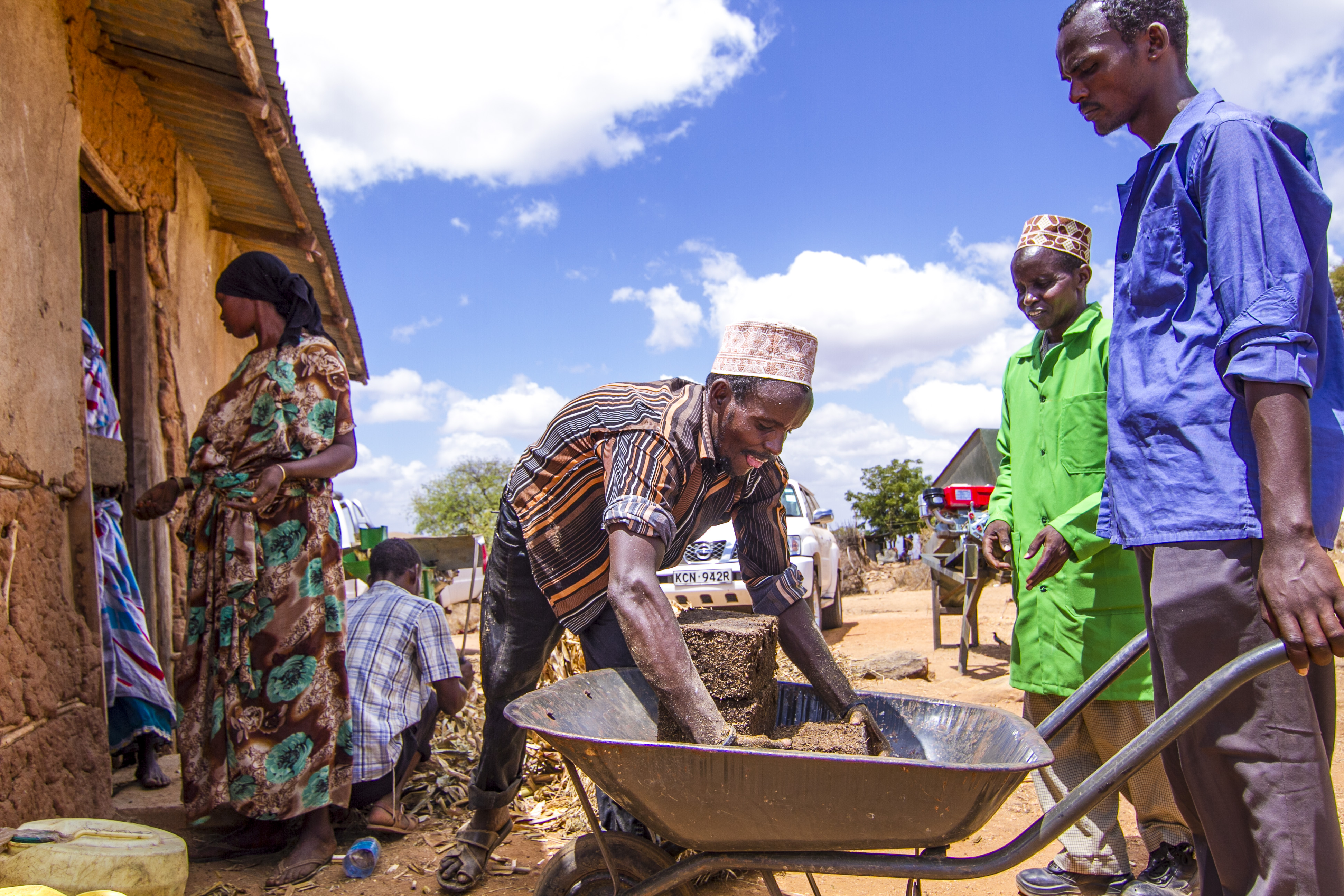Drought Cure is a nutritious food brick that can be stored for long periods to sustain livestock during droughts, which recurrently plague the Horn of Africa. Devised by a farmers' cooperative from Marsabit in Northern Kenya, the brick is a lifeline for pastoralists in the region, who rely on livestock for their livelihood. It is made from locally-available materials including crop residuals, grass, leaves, pods and tubers, which are mixed with commercial nutrients. It can be stored for longer periods to see farmers through the drought period and is used to revive weak livestock.
The devastating 2011 drought in the Horn of Africa marked a turning point for a group of small-scale livestock farmers from Marsabit County in Northern Kenya. In despair after losing most of their livestock, the 25 women and 17 men formed a cooperative with the aim of working together to find a solution to the problem. That drought lasted more than a year, resulting in 13 million people in immediate need of food aid. Across the region, between 50,000 and 260,000 people are said to have died.
Experts say the drought cycle is becoming shorter, with dry periods more frequent and intense as a result of climate change and environmental degradation. This affects crops, livestock and communities, as people move in search of new pastures.
“Livestock is the sole source of income for pastoralist communities and losing animals through cyclic droughts leads to deeper levels of poverty, higher school drop-out rates, depression and hopelessness,” say the group.
Their solution was to create an alternative fortified feed for livestock – made from locally available materials such as crop residuals, grass, leaves, pods and tubers, which are then mixed with commercial nutrients.
Compressed into a brick or available in powder form, this highly-nutritious feed can be stored for long periods and used when needed. Indirectly their product will also improve child nutrition, as a result of healthier livestock throughout the year.
The group is now registered as a limited company, known as TESSO Fodder Millers Co. Ltd. and has the potential to scale the innovation tenfold. With low production costs, this community-driven initiative is seeking investment of STG £10,000 over two years to expand their reach across Marsabit County, Kenya’s largest semi-autonomous region of more than 310,000 people. Their plan is to focus investment on quality testing the product, packaging and branding, research and development, product advertisements and marketing materials. They also plan to secure partnerships with local retailers and distribution networks.
“If we can support milk and meat production during dry and normal seasons and generate income for share-holders we can also reduce the movement of people in search of pasture. This will result in more integrated families and a reduction in school dropout rates,” they say.
More Detail About the Innovation
Problem: Recurrent droughts leading to livestock deaths, impacting directly on the health and livelihoods of communities.
Solution: An alternative fortified feed for livestock – made from locally available materials such as crop residuals, grass, leaves, pods and tubers, which are mixed with commercial nutrients. The feed is available in briquettes or powder.
Current status: TESSO Fodder Millers Co. Ltd. is registered as a limited company with an existing supply of products within Tesso sub-location, Marsabit County. The business is supported by Maarifa Kona, a consortium between Adeso, iHub and Mastercard.
Business model: The group aims to target the county government, the pastoralist community in Marsabit, members of the cooperative and animal feed distributors.
Sales Forecast: Year 1: KES 5,670,000 Year 2: KES 5,953,500 Year 3: KES 6,237,000 Gross profit before tax: Year 1: KES 1,167,900 Year 2: KES 1,451,400 Year 3: KES 1,509, 795 Proposition: TESSO Fodder Millers Co. Ltd is seeking an investment of GBP 10,000 (over 26 months) to scale their idea and reach different markets within the vast Marsabit County.
Prospects: Growth of the customer base to reach and surpass 1,000 clients within three years. Increase and improve production of the product and directly reduce/mitigate livestock death with the county.
About the Founders: Adan Gollo Jillo - Innovator ;Guyo Halo Dokata - Innovator ;43 Group Members to assist with sales, marketing and production
Endorsements: Application has been made for testing and validation by Kenya Bureau of Standards (KEBS)
Contact: Email: guyodokata@gmail.com Tel:+254 713381212
Read more about other innovations from the DEPP Innovation Labs.

